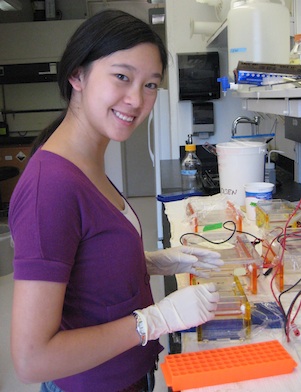Red Rice in High School Teaching
Through a collaborative effort involving WU Science Outreach, the Olsen lab, and St. Louis area high school biology teachers, the red rice system is being developed as a training tool for teaching about the genetics of adaptation and impact of weedy species in agricultural contexts. Washington University supports an active training and support program for K-12 teachers through its nationally recognized Science Outreach program. With funding from NSF and HHMI, Science Outreach directs the Summer Research Fellowships for Science Teachers (SRFST). A coordinator provides application, selection and placement assistance, and arranges weekly journal clubs for the teachers. Teachers work as summer lab interns for 6-8 weeks, and a final symposium provides a forum to share successes and lessons learned. Teacher training typically takes the form of a 2-year summer internship, where teachers learn about the research project their first summer and return the second year to develop the class unit.  During the summer of 2011, the Olsen lab hosted Ms. Anne Puzzo, a biology teacher at Granby High School (Granby, CT). Ms. Puzzo worked with Southeast Asian weedy rice plants to learn basic molecular lab techniques (DNA extraction, PCR, DNA sequencing) and to work with visiting scholar Prof. BK Song (Monash University, Malaysia) in examining the population structure and evolution of Malaysian weedy rice strains. About the photo: Amy Wen is Washington University undergraduate who participated as a 2011 summer lab intern through Washington University’s Summer Scholars program, which targets academically excellent pre-freshmen for summer research experiences. Amy examined variation in plant architecture in Southeast Asian weed strains as related to genetic variation at a candidate domestication gene.
During the summer of 2011, the Olsen lab hosted Ms. Anne Puzzo, a biology teacher at Granby High School (Granby, CT). Ms. Puzzo worked with Southeast Asian weedy rice plants to learn basic molecular lab techniques (DNA extraction, PCR, DNA sequencing) and to work with visiting scholar Prof. BK Song (Monash University, Malaysia) in examining the population structure and evolution of Malaysian weedy rice strains. About the photo: Amy Wen is Washington University undergraduate who participated as a 2011 summer lab intern through Washington University’s Summer Scholars program, which targets academically excellent pre-freshmen for summer research experiences. Amy examined variation in plant architecture in Southeast Asian weed strains as related to genetic variation at a candidate domestication gene.
